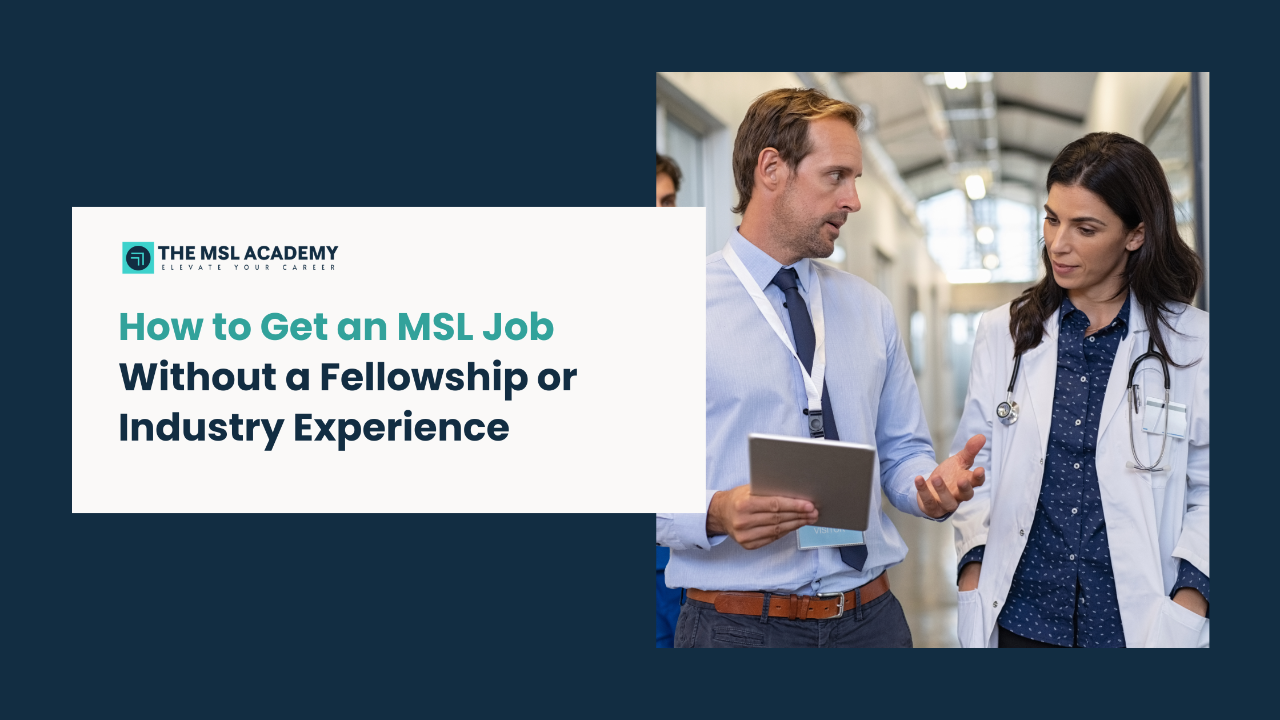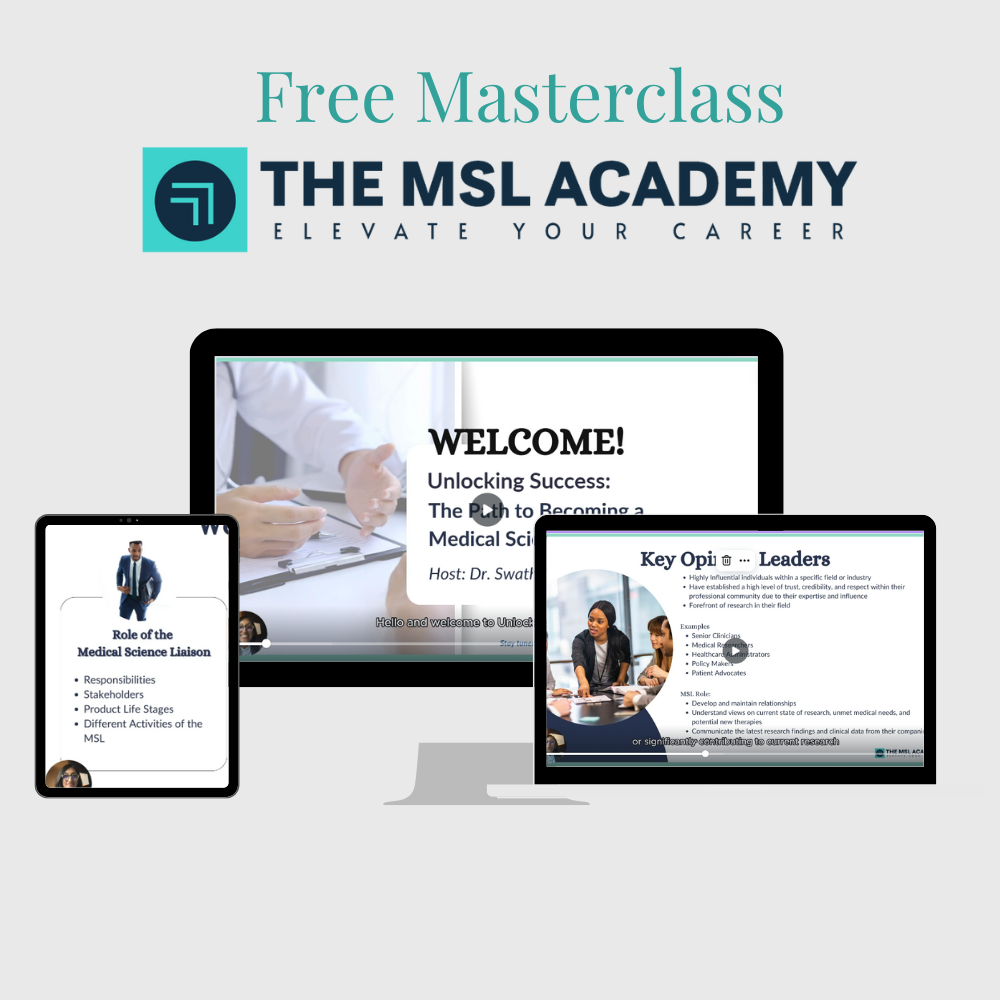How to Get an MSL Job Without a Fellowship or Industry Experience
Aug 07, 2025
Breaking into the pharmaceutical industry as a Medical Science Liaison (MSL) can feel overwhelming, especially if you have not completed a fellowship or worked in pharma before. You may be asking:
“Can I really get an MSL job without industry experience?”
The answer is yes, and many professionals have done exactly that.

In today’s competitive landscape, fellowship programs and industry roles can certainly be helpful, but they are not prerequisites for success. Hiring managers are more interested in what you can bring to the table now: communication skills, scientific acumen, emotional intelligence, and therapeutic fluency.
This blog post outlines an actionable roadmap to help you land your first MSL role without a fellowship or pharma background. Whether you are a PharmD, PhD, MD, NP, or PA, this guide will help you bridge the gap and launch your career in medical affairs.
Step 1: Understand What MSLs Actually Do
The Medical Science Liaison is a field-based medical affairs professional who serves as a bridge between pharmaceutical companies and the healthcare community.
Core Responsibilities:
- Exchange of scientific information with Key Opinion Leaders (KOLs)
- Provide medical and scientific support for clinical trials
- Serve as subject matter experts in a specific therapeutic area
- Gather field insights that inform strategy
- Present data at scientific congresses or advisory boards
- Support internal cross-functional teams with clinical guidance
An MSL is not a salesperson. MSLs operate in a non-promotional capacity and are evaluated on scientific engagement and strategic impact, not product sales.
Step 2: Reframe Your Existing Experience
If you are coming from academia, clinical practice, or research, you likely already have highly transferable skills. You just need to frame them in a way that resonates with MSL hiring managers.
Translate Your Skills:
|
Your Background |
MSL-Translatable Skill |
|
Presented at grand rounds or academic conferences |
Scientific communication |
|
Ran or supported a clinical trial |
Clinical trial operations knowledge |
|
Worked as a healthcare provider |
Real-world understanding of patient care |
|
Wrote scientific papers |
Data synthesis and storytelling |
|
Collaborated on multidisciplinary teams |
Cross-functional collaboration |
Tip: Use language from job descriptions and mirror the way competencies are described in MSL postings. This shows alignment with the role even if your background is outside industry.
Step 3: Gain Therapeutic Area Expertise

You do not need to be a published expert to be seen as a credible scientific peer. But you do need to show curiosity, initiative, and fluency in a specific therapeutic area.
How to Build Therapeutic Fluency Without Industry Access:
- Read the top 5–10 pivotal clinical trials in your chosen area.
- Understand key endpoints, safety signals, and mechanism of action (MOA).
- Learn the competitive landscape: who the major players are, what drugs are approved, and what is in the pipeline.
- Follow KOLs on social media like LinkedIn and Twitter/X.
- Join disease-specific associations, newsletters, or virtual journal clubs.
Demonstrating knowledge in a therapeutic area shows hiring managers you are capable of having scientific conversations on day one.
Step 4: Optimize Your Resume and LinkedIn for the MSL Role
This is where many aspiring MSLs fall short. Your resume should not read like an academic CV. Instead, it needs to reflect industry language and MSL-specific competencies.
Resume Tips:
- Start with a strong summary:
“PhD neuroscientist with expertise in CNS disorders and a proven track record of scientific presentations, data analysis, and clinical collaboration. Actively pursuing MSL opportunities in neurology.” - Add a Key Competencies section:
Scientific exchange | KOL engagement | Clinical trial support | Insight gathering | Disease state education - Quantify impact for every bullet (if possible):
“Presented weekly data updates to cross-functional research teams of 15+ scientists and clinicians.”
LinkedIn Tips:
- Headline:
“Aspiring MSL | PharmD | Oncology Researcher | Scientific Communicator” - “About” section:
Summarize your clinical or scientific background, highlight your interest in medical affairs, and state your goal clearly: becoming an MSL. - Post regularly:
Share key takeaways from recent papers, comment on scientific news, and engage with industry leaders. Visibility matters.
Step 5: Master the MSL Interview Process
Getting the interview is just the beginning. Interviewers will evaluate how well you understand the MSL role, your communication style, and your potential to represent the company credibly in the field.
Stages to Prepare For:
- Phone Screen: Recruiters assess fit, enthusiasm, and basic qualifications.
- Hiring Manager Interview: Focuses on scientific communication and role understanding.
- Panel Interview: May include medical, commercial, and HR stakeholders.
- Scientific Presentation: You will present a paper or disease state overview.
Step 6: Build a Network That Supports Your Goal
Your network can accelerate your entry into medical affairs exponentially. The goal is not to “ask for a job” but to build relationships and gain insights.
Start With:
- 10–20 current MSLs, if possible in your desired therapeutic area
- Medical Affairs Directors or hiring managers
- Recruiters who specialize in MSL placements
Tactics That Work:
- Thoughtful DMs after engaging with their posts
- Commenting consistently on their content to stay top-of-mind
- Attending free industry webinars or LinkedIn Live sessions (like those hosted by The MSL Academy)
Many of our Platinum students have been referred for interviews through someone they met on LinkedIn.
Step 7: Learn the Language of Medical Affairs

Every industry has its jargon, and medical affairs is no different. Understanding and using MSL terminology gives hiring managers confidence that you have done your homework.
Key Terms to Know:
- Scientific Exchange: Non-promotional sharing of clinical or medical data
- KOL (Key Opinion Leader): Respected HCPs in a specific therapeutic space
- Insight Gathering: Collecting field intelligence to inform company strategy
- IIT (Investigator-Initiated Trial): HCP-driven clinical research supported by industry
Reading job descriptions, attending MSL webinars, and engaging with medical affairs content will help you sound like an insider even if you are not one yet.
Step 8: Fill the Gaps with Real-World Training
This is where we come in.
If you know you are MSL-ready but unsure how to showcase your value, the Excel Into MSL™ Platinum Program was built for you.
Our alumni have landed roles at companies like Sanofi, Bristol-Myers Squibb, Genentech, Amgen, without prior industry experience.
What You Get:
- Resume, cover letter, and LinkedIn tailored for medical affairs
- One-on-one coaching from real MSLs and hiring managers
- Scientific presentation feedback
- Role-play prep with six live coaching sessions
- Access to the MSL-BCS™ Board Certification
- Our success guarantee (if you do not land a role in six months, we will continue to help you until you do!)
You do not need a fellowship. You need strategy, storytelling, and positioning.
Final Takeaway: Fellowship Optional. Commitment Essential.
You can absolutely become an MSL without a postdoc or industry job on your CV. But breaking in requires:
- A deep understanding of what the MSL role involves
- Translating your academic or clinical background into MSL competencies
- Therapeutic area fluency and initiative
- Strategic resume, networking, and interview preparation
Do not wait until you feel “ready.” Start positioning yourself now, because momentum compounds.
Want to Become an MSL Without a Fellowship?
At The MSL Academy, we help aspiring MSLs break into industry faster and with more confidence. Our Excel Into MSL™ Platinum Program was designed for professionals just like you and includes everything you need to go from overlooked to offer.
Spots fill fast. Apply today and let us help you build your MSL career!



